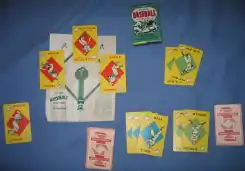Baseball (or in some early editions, "Batter-Up Baseball") is a card game simulating the sport of baseball, played with special cards and a diagram of a baseball diamond. The game was created by Ed-u-Cards Manufacturing Corporation, New York.
The deck
The deck consists of 36 cards representing a variety of base hits, (mostly singles, but only one home run), balks, stolen bases, a hit-by-pitcher, balls, strikes, and a variety of outs.

A typical deck from the late 1950s or early 1960s consists of:
- 10 balls
- 10 strikes
- 2 foul balls
- 2 fly outs
- 1 foul out
- 2 singles
- 2 doubles
- 1 triple
- 1 home run
- 1 balk
- 1 stolen base
- 1 hit-by-pitcher

Earlier decks omitted the balk, stolen base, and hit-by-pitcher, in favor of an additional ball, an additional double play, and an additional single.

In some editions from the 1960s, strikes and outs are color-coded orange, balls green, and all cards that advance a runner, blue, while in late-1950s editions, strikes and outs are green, balls blue, and cards advancing a runner, red. The cards are illustrated with line drawings of the action represented by the card; in the 1960s, a New York Mets edition included Mr. Met as the principal figure in the illustrations, and a Mets logo as the back design.
The play
The game is playable by any arbitrary number of players (the box stating that it "can be played by 1 to 9 players"). The cards are not dealt; instead, whichever player is "at bat" turns over cards from a freshly shuffled deck until put out three times, following the actions named on the cards:
- Strikes are collected, with three strikes becoming an out (and clearing any collected balls).
- Balls are collected, with four balls becoming a walk (and clearing any collected strikes).
- Outs are collected (with each out clearing strikes and balls) until the third out ends the player's turn. If the out is marked "double play at first," and a double play at first is possible, then it counts as a double play.
- Base hits, walks, and hit-by-pitcher are placed on the diamond diagram, with any cards already on the diagram advancing appropriately. A base hit clears the balls and strikes.
- Balks and stolen bases advance runners according to the instructions on the card, and actual baseball rules.
An inning consists of each player getting a turn "at bat" for three outs; a game consists of nine innings. Scoring is as in an actual baseball game.
Availability
This game had a limited print run, but decks of varying vintage can be found online. Or one could improvise a deck from the same "VisEd" cards traditionally used in the game of 1000 Blank White Cards.